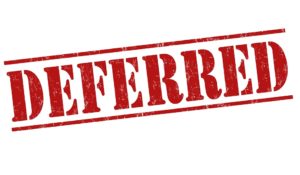
In some cases, it is possible to modify or suspend a Chapter 13 payment, although the potential to do so is dependent on each individual case. First and foremost, don’t ignore the situation. Address it as quickly as possible. If you feel that the situation is out of hand and you are not going to be able to make a payment towards your Chapter 13 plan as agreed, address it before you have actually missed the payment. Many Chapter 13 filers who find themselves in this situation will be reactive when a proactive approach will leave them with better results.
In addition to being dependent upon case-by-case specifics, the possibility of obtaining a modification or suspension of the Chapter 13 plan payment will also depend heavily on the specific Chapter 13 bankruptcy trustee handling your case. They could have extremely strict procedures and protocol in place that would govern the request for modification.
The Chapter 13 bankruptcy plan is a repayment of some or all of the debt you had when filing bankruptcy over the course of 3-5 years. Before missing a payment completely, consider whether or not you can make a partial payment followed by a month or two in which they can overpay to get caught up according to the Chapter 13 plan. In many cases, this is the best solution and will work for both the petitioner and the trustee. Some who find themselves unable to make their Chapter 13 payment would do well to consider converting to a Chapter 7 bankruptcy. For those who do not qualify for Chapter 7, there are a couple obstacles in the way that have to be considered.
#1: Mortgage/Car Payments – In some bankruptcy districts, filers are required to include their mortgage and vehicle loan payments in the Chapter 13 plan payment – turning it into one large consolidated payment. In this type of situation, missing your Chapter 13 plan payment means missing a mortgage and/or car payment. This could lead the trustee to quickly file a motion to dismiss your Chapter 13 bankruptcy case. If this happens, you’ll be scrambling…both to oppose the trustee’s motion and get caught up on the past due payment.
#2: Permanency of the Problem – If you suspect that you are going to miss a payment or be short on a payment, sit down and decipher what is happening. Did you receive a decrease in pay? Did your vehicle need unexpected maintenance or repair? Did your purse get stolen with a chunk of cash inside? Then figure out if the situation is temporary or permanent. Can you still afford the payments? Or are you going to be in the same situation every month for the foreseeable future? If you fall behind on one month’s payment and then catch up, it should be fine. But if you don’t have the ability to get caught up, there’s a bigger problem.
#3: Timing – When is the best time to file the motion to modify or suspend the plan payment? Be proactive. If you are working on the assumption that you may be able to suspend or reduce your payment, decide now when the best time would be to make the request. Don’t put it off until time passed has limited or eliminated your choices.
If you need assistance with your southern California bankruptcy filing or motion to modify Chapter 13 plan payment, please contact one of the experienced bankruptcy attorneys at Westgate Law.
